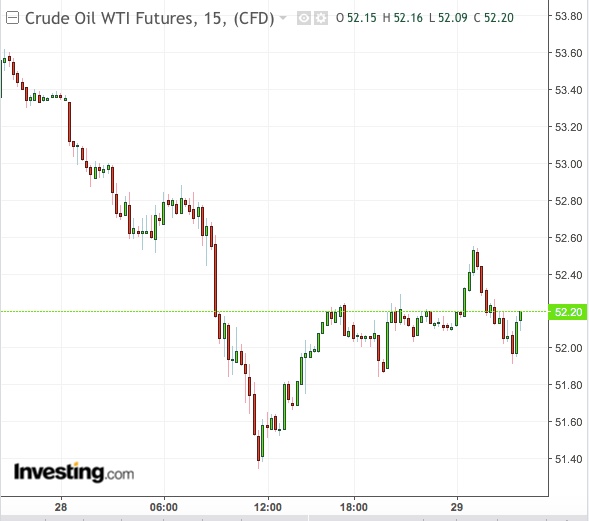The much-anticipated U.S. sanctions on Venezuelan oil are in. What hasn’t emerged is the rally many had expected from the throttling of heavy, sulfur-laden crude supply which American refiners need for producing diesel and other transportation fuels.
In Tuesday’s early trade, the world’s two most prominent oil futures benchmarks—the U.S. West Texas Intermediate and London’s Brent—were both up less than half a percentage point in Singapore. That global oil prices couldn’t see meaningful gains despite U.S. companies being banned from doing business with Venezuela’s state oil firm PDVSA speaks volumes about the expected impact of the sanctions.

The absence of a major rally was even more startling considering Monday’s crash of 3 percent in both WTI and Brent futures. A commensurate recovery in Tuesday’s futures trade would have justified the perceived shortage of “sour” crude in the market that refiners in the U.S. Gulf Coast of Mexico in particular counted on Venezuela for.
Multiple Mitigating Factors
But as it stands, multiple mitigating factors may prevent oil bulls from getting the payday they expect from the political crisis unfolding in Caracas.
Chief among them, said Phil Davis, founder of PSW Investments in New York, was the outlook for the global economy, which was deteriorating faster than any supply tightness in oil created by OPEC production cuts.
Monday’s slump in oil prices came as profits at Chinese industrial firms contracted in December for a second straight month, amplifying weak signals from the world’s second biggest economy right after a dire global outlook posted by the International Monetary Fund. Beijing also reported a week ago that its economy grew at the slowest pace in nearly 30 years in 2018. U.S. companies that manufacture in China, such as Caterpillar (NYSE:CAT) and NVIDIA (NASDAQ:NVDA), meanwhile, issued profit warnings.
Anemic Demand
Davis added:
“The result of all these is anemic demand for oil as a whole, right from gasoline to diesel and aviation oil to railroad fuels. In the U.S., you won’t see major holiday travel until Memorial Day, which means slower gas business at pumps. There won’t be any inordinate trucking activity to deliver holiday packages. So, while there may be a shortage of sour crude for making diesel, actual demand for diesel itself is much lower than what’s required for a sustained rally in oil.”
Despite output cuts by Saudi Arabia, Russia and other members of the enlarged OPEC+ producer club since December, the world isn’t exactly short of oil.
The International Energy Agency said in September global supplies reached a historic 100 million bpd in August. U.S. gasoline stockpiles hit record highs last week and the American Petroleum Institute cautioned that those inventories “could approach burdensome levels”, weighing further on pump prices that have barely recovered from last year’s 40 percent slump despite a 15 percent rebound year-to-date in WTI futures.
Venezuela Still Free To Export Outside The U.S.
One countervailing effect to the sanctions announced by the Trump administration was that while they forbid PDVSA from earning money for exports to the U.S., there were no restrictions on the sale of Venezuelan oil to other countries. That means the government of Nicholas Maduro—who Washington no longer recognizes as Caracas’ legitimate leader—is free to redirect its crude.
Due to the country's decade-long impoverishment and lack of investment in production, oil exports from Venezuela to the U.S. have fallen from 1.2 million barrels per day to less than 500,000 bpd. That accounts for less than 10 percent of total U.S. oil exports, standing at anywhere between 5 million and 8 million bpd a week.
U.S. Gulf Coast refineries that had relied heavily on Venezuelan oil over the years have tried to turn to “sweet” light crude, as well as medium-grade oil, as the supply of sours tightened amid declining production in Mexico and, lately, lower exports from OPEC. Valero (NYSE:VLO), Chevron (NYSE:CVX) and Citgo are among the largest importers of Venezuelan crude in the U.S.
Difficulty in sourcing heavier grades led to five-year highs in the premium for the sour-type Mars Blend versus WTI last week.
Canada, already the largest supplier of all types of oil to the U.S., has enough heavy crude but can’t ship easily to Gulf Coast refineries due to a lack of pipelines.
Creative Thinking Will Help U.S. Refiners Find Alternatives
Yet, Iraq, Colombia and Mexico could redirect some of their heavier oil blends to the U.S. if Venezuela tries to sell to Asian customers due to the U.S. ban.
All this proves one thing: with some creative thinking and planning, refiners can make do with the new sanctions.
The American Fuel & Petrochemical Manufacturers, which represents 95 percent of the refining sector, is already indicating this after it barely opposed Washington’s sanctions against the PDVSA on Tuesday, while it had lobbied hard in the past against any attempts to restrict Venezuelan oil supplies.
Last But Not Least: The Trump Factor
Given the abundant supplies of gasoline in the market, it is unlikely that U.S. pump prices will shoot up much from the sanctions.
Of course, all this could change if Maduro remains in power much longer than anticipated, blocking the ascension of opposition leader Juan Guaido, whom Washington recognizes as Caracas' new leader.
Should crude futures begin to rally sharply from the crisis, there’s always the possibility that President Donald Trump, whose disdain for high oil prices is well known, could issue a new round of sanction waivers for Iranian oil to tamp the market down, like last year.
Said PSW’s Davis:
“Of all of the unknowns in the oil market, Trump’s the biggest. You’d never know what he’s capable of.”
